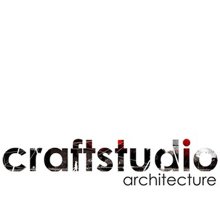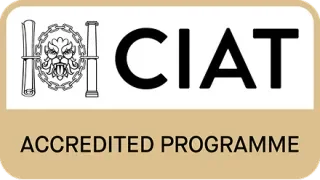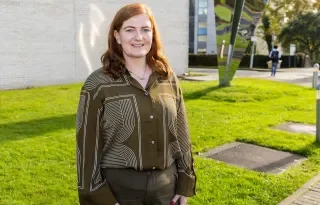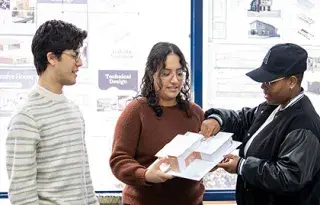BSc (Hons) in Architectural Technology

Search to find a different course
Course Overview
This course integrates technical theory with practical application to equip students with real life problem solving and communication skills and a broad understanding of construction technology and detailing, building regulations, health and safety legislation and the theory and integration of environmental and sustainable design. It incorporates a low energy technical design project and a research project which will equip them as they set off on their career as a professional architectural technologist.
Throughout the course students will be sharing modules with Building Surveying, Construction Management and Quantity Surveying students and will work on projects together with these students in multi-disciplinary teams, while remaining focused on their own discipline.
This prepares students work the world of work where Architectural Technologist will work with Building Surveyors, Construction Managers and Quantity Surveyors to ensure the successful completion of projects for clients.
At the end of Year One, Architectural Technology students may request to transfer to the Building Surveying course.
What makes this course different
Work Placement
In Year 3 students undertake an industry work placement where they gain important contacts within the industry to help them in their future careers.
Graduate Prospects
91% of graduates are in full-time employment or further study after 6 months of graduating (83% in full-time employment, 8% further study) - (DkIT/HEA Graduate Survey)
Accredited in Principle by CIAT
This course is Accredited in Principle by the Chartered Institute of Architectural Technologists (CIAT), ensuring that it has been assessed in terms of content, structure, and resources and has met CIAT's requirements.
Understanding the Industry
Architectural Technology is the application of science and engineering knowledge to the design of buildings. Architectural Technologists are technical designers, skilled in the application and integration of construction technologies in the building design process. They work together with architects in multidisciplinary teams to achieve efficient and effective technical design solutions which are robust, durable, and sustainable.
Career Opportunities
Typically employers include architectural firms, public and private bodies, planning departments and local authorities, private construction firms and material manufacturers. The architectural technologist is a key member of the design team and collaborates closely with the architect to provide objective technical advice. Demand from local, national and international companies is exceeding current supply of suitably qualified graduates.
Future Careers:
- Architectural Technologist
- CAD Technician
- Fire Risk Assessor
- Urban Designer
In these areas:
- Engineering
- Construction
- Architecture
- Estates Management
Graduates work at



Course Delivery and Modules
- Construction Technology
- Domestic Construction (Project)
- Services for Domestic Buildings
- Measured Surveys
- Building Quantification
- AutoCAD
- BIM
- Construction Technology
- Architectural Design
- Architectural Technology (Project)
- Materials Performance and Specification
- Building Regulations
- Services for Commercial Buildings
- Structures
- BIM
- Construction Technology
- Health, Safety and Environmental
- Procedures and Documentation
- Planning and Development Control
- Building Control
- BIM
- Work Placement Semester
- Architectural Conservation and Maintenance
- Project Management
- Capstone Project (including research)
- Passive House Design
- Professional Practice and Entrepreneurship
- BIM
Work placement
In 3rd year students undertake a 1-semester work placement with a host company. The placement is arranged through the dedicated Placement Office. This provides students with a valuable opportunity to develop their professional skill sets and start to build their career networks.
Professional Accreditations
This course is Accredited in Principle by the Chartered Institute of Architectural Technologists (CIAT).
CIAT is a dynamic, forward-thinking and inclusive global membership qualifying body for Architectural Technology. CIAT Accreditation ensures that this course has been assessed in terms of content, structure, and resources and has met CIAT's requirements. The benefit of studying on a CIAT Accredited course is that it will support individuals wishing to become Chartered Architectural Technologists.

Education Progression
Postgraduate Diploma in Building Surveying
MSc in Building Surveying
Fees and Funding
Please find information on fees and funding here: www.dkit.ie/fees
Entry requirements
Standard entry requirements apply. There are no special entry requirements for this course.
- Standard Requirements for Leaving Certificate Applicants
- Standard Requirements for UK/NI Applicants
- Standard Requirements for QQI-Further Education Applicants
Recent CAO points
How to apply
Apply on CAO
All standard entry first-year applicants must apply for entry through the CAO. See Important application dates for CAO and information for specific applicant types below:
Advanced Entry & Transfer Applications
Advanced Entry is for applicants who have previous educational achievements and/or work experience and want to be considered for direct entry into year 2, 3, or 4 of a course. This includes students looking to transfer to DkIT from another Higher Education provider.
International Application (non-EU)
International Applicants (not from or living in the EU) can apply through an agent or directly to DkIT to study this course.
Ask us a Question
If you have a question about the BSc (Hons) in Architectural Technology please ask it below and we will get back to you.
Course News
View all NewsDisclaimer: All module titles are subject to change and for indicative purposes only. All courses are delivered subject to demand and timetables are subject to change. Elective Module options will only run subject to student numbers. The relevant Department will determine the viability of each elective module option proceeding depending on the number of students who choose that option. Students will be offered alternative elective modules on their programme should their preferred elective option not be proceeding. Award Options for Common Entry Programmes: The relevant Department will determine the viability of each award option proceeding depending on the number of students who choose either option. If the numbers for one of the Award options exceed available places, students for this option will be selected based on Academic Merit (highest grades).




